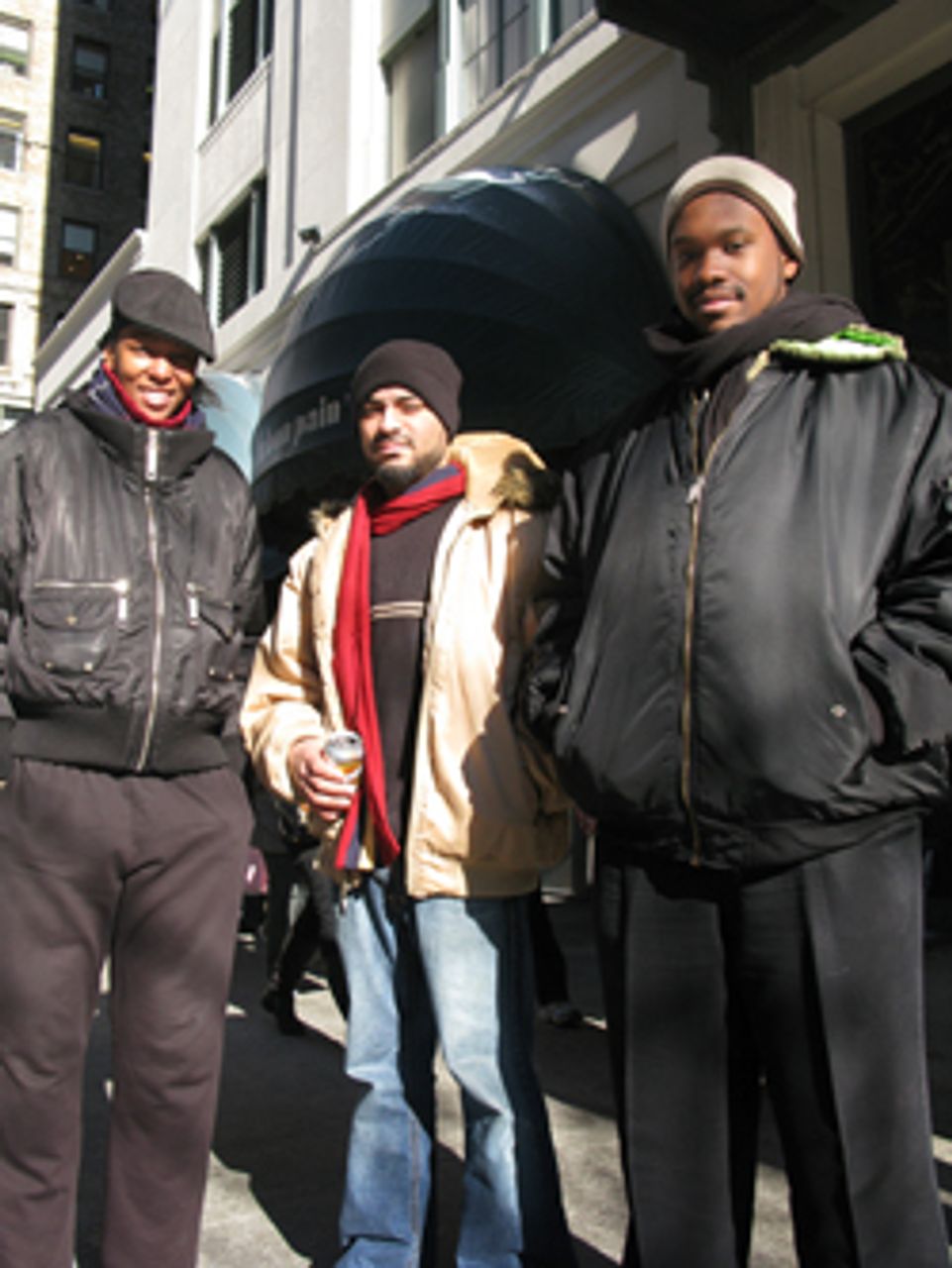On Monday Macy's, one of the largest department store chains in the US, announced plans to lay off 7,000 workers, some 4 percent of its work force. Each of the firm's 840 stores—operated as Macy's or Bloomingdale's—will lose an average of five to six employees. In addition, approximately 40 percent of management positions will be eliminated.
The Washington Post called the move part of "a massive reorganization in the face of slumping sales and depressed consumer spending." Contributions to employees' retirement funds will also be reduced, company officials told the media.
Moody's Investors Service indicated Monday it might lower ratings on the 150-year-old chain into "junk territory" after Macy's forecast significantly lower earnings for 2009.
The department store chain is one of the icons of American commerce. The Hollywood film Miracle on 34th Street (1947) was set in Macy's flagship store, located in mid-Manhattan's Herald Square.
 Macy's stockroom workers (left to right):
Macy's stockroom workers (left to right): Crystal, Rob and Ben
Following the announcement of the mass job cuts, a WSWS reporter spoke with employees at the Herald Square location. News reports indicate that no layoffs are planned immediately in New York City, but the implications of the job cuts and the possibility of more are on the minds of the workers there.
Ben, a young merchant handler, who works in the stockroom, told the WSWS: "What we hear on our floor is that you can have been working here five years and they can just lay you off. I've only been here one year, so that doesn't make me feel too good about things.
"The layoffs aren't affecting the Herald Square store directly yet, but if things get worse then they definitely will. But they are cutting hours left and right. We call it job-sharing hours. If you take my hours and add them up to his hours they come out to 40. It doesn't take a genius to figure out what they're doing it for. Only the full-timers get benefits and they don't want to pay that. We would all be full-time here if we could."
Rob, another merchant handler, commented: "Everywhere the country's in a mess. It's sad to see so many people losing their homes. We're the ones who make the country run. We all do our part, and then you lose your job and what are you going to do?
"You just can't go to another bank and say ‘Give me another loan.' At the end of the day, you still have to pay all your bills and, even with a job, it's hard to make ends meet. I worry about being able just to pay my cell-phone bill every month. We talk about this every day around here. I like to say that ‘We're the ones who have to bite the bullet and eat the crap sandwich.'
"I actually know people down the street at the 11 Penn building—the ones who design and make some of the clothes that are sold here at Macy's, and they're getting fired like crazy. My sister actually works for one of the companies there and she told me how terrible she felt when they just got rid of ten of her co-workers."
Ben continued: "Look at the first bailout—what has that done? Nothing! They just keep asking for more. It's so bad out there right now. I would say that the tourists, a lot of them foreign, are the only ones keeping this store going. When you see New Yorkers, it seems they are going straight up to the fifth floor to the clearance rack. It's been very slow.
"Back in stock, we have a ticket system for when workers on the floor send back orders to the stock room. Lately we've been getting only 4 or 5 tickets a day in my department. It's terrible—we used to get hundreds.
"But it's everywhere. Look at [electronics and appliance retailer] Circuit City, that's a prime example. Who would have thought that store would just suddenly close down? And we haven't even hit rock bottom yet and I believe we really might. This isn't just going to last four years, I really think it's going to go on for a long time. We somehow have to endure it.
"I've heard that they [the US government] send billions of dollars a week over to Iraq and Afghanistan. Do you know what you could do with that kind of money—the people and the communities that you could help out? They couldn't even find a firecracker over there in Iraq for all their talk about weapons of mass destruction. What was all this for? If I could ask Bush one question it would be ‘What did you accomplish with this war? All of the dead and all the money, and for what?'
"The money needs to be spent on the people that need it," Ben went on. "Help them out! My father works for the MTA [Metropolitan Transportation Authority] and he talks about this all the time, how tough the situation is in this country, the greed, the cutbacks. We all split our hours to help out the other guy—to help each other. These guys on Wall Street don't sacrifice anything. It's all for their benefit. They don't have laws against greed and that kind of stealing, but they should. Look at Bernie Madoff—perfect example. Look at how many billions he had to steal before they even put him under house arrest.
"You walk around here and listen—everybody's got their own story. This thing is affecting everyone."
Another stock room worker, Abraham, was passing by and put in: "There are people now applying here at Macy's who were making six-figure salaries before getting laid off somewhere else. It's a scary thing—we don't know what's going to happen."
